The TechCrunch team is in Barcelona this week to bring you all the action going on at Mobile World Congress 2024. You already know what we’re expecting, so sit back, relax and stay tuned throughout the week as we bring you the products, announcements and startup news from MWC that you need to know.
So far, we’ve seen some big announcements from companies, including new Android features from Google, Lenovo’s new laptop concept and rollable phone concept and Xiaomi’s robotic dog. As MWC progresses, here’s how you can follow along with our team’s coverage.
After the show
Showee’s smart shower
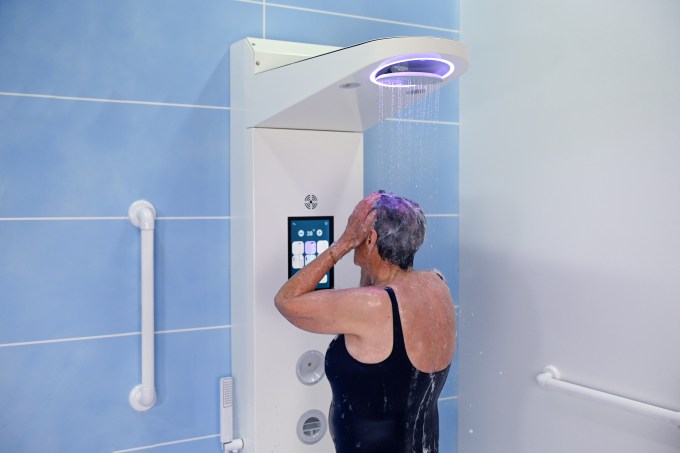
Showers have never been more fun, or more accessible to people with disabilities than with Showee. The startup built a smart shower designed for people with disabilities who face challenges both physical and intellectual. It has a height-adjustable structure, and also includes a smart touchscreen that guides users through each step, from wetting and lathering to drying. Finally, a hands-free dryer! The video is also fun to watch.
Friday, March 1
Ultraleap is bringing haptic touch to cars and VR headsets
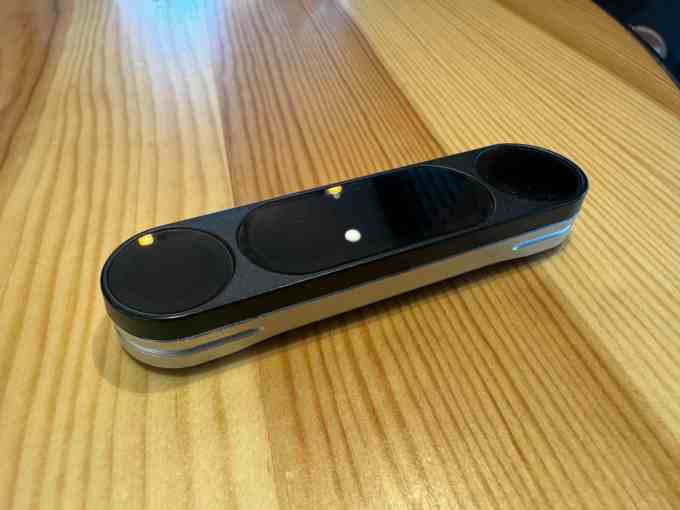
If you don’t know what haptics are, you will by the end of this article. Brian Heater spoke with Ultraleap co-founder and CEO Tom Carter about adapting the technology for use in automotive and virtual reality. However, that’s not all the company can do with it.
Swayy helps you tell your friends where you will be
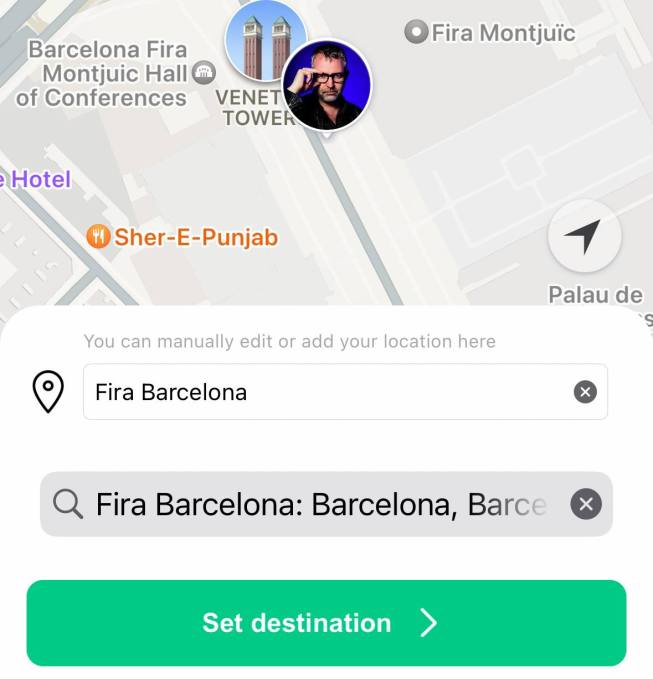
Instagram now has the “Friend Map” feature; maybe you were yearning for a midday cup of joe and were hoping one of your friends could join you. Swayy wants to go one step further than just saying where you are at the moment and has an iPhone app that enables you to share where you plan to go in a couple of hours or even a month from now.
Thursday, February 29
Brain.ai and the future of smartphones
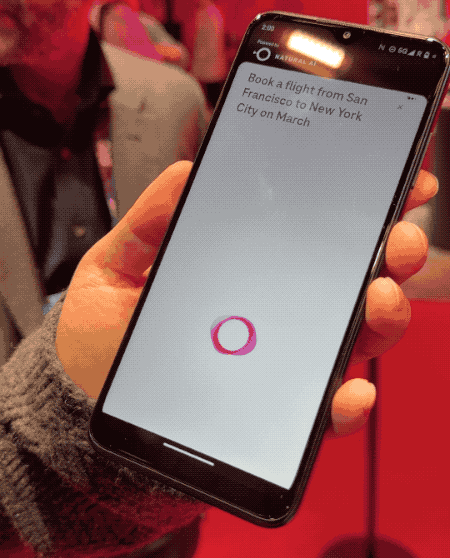
Earlier this week, Brian Heater met with Brain.ai founder and CEO Jerry Yue and what resulted is a delightful chronicle of how generative AI might be foundational to the next generation of devices.
The AI and interface company’s operating system is likely to be seen in the United States in the device known as the T-Mobile REVVL (known as the “T Phone” in international markets like the EU), Brian writes. The precise model, release date and nature of the deal will be revealed “soon,” according to Yue.
“From a privacy and security perspective, we want to give a new level of control that people don’t have right now,” Yue said. “The computer’s understanding of you, now it’s aggregated into different apps. These AI models are black boxes — recommendation machines that exploit our attention. We believe in explainable AI. We will be explaining to you, each step of the way, why we are making a recommendation. You have more people owning the AI and not big tech black boxes.”
Wednesday, February 28
Liveliness wants to help you find a workout buddy
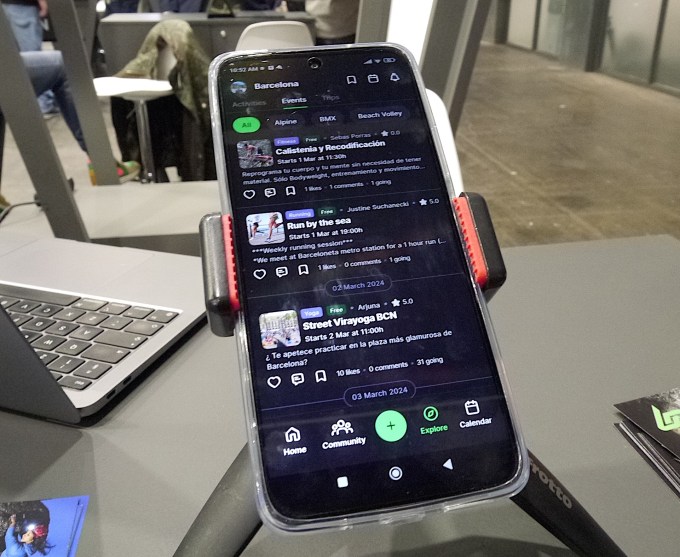
Liveliness is building a community app around shared sporting passions. The free app offers a chat function and the ability for users to set up events that other users can sign up to join. It also features a feed of (non-user) organized events geared toward learning and improving at different sports, such as running clubs, street yoga, calisthenics sessions and so on. These can include paid events, giving the startup a route to earning commissions. It also plans to monetizes through a premium version of the app, with additional features for subscribers.
Sweanty’s wearable patch for athletes
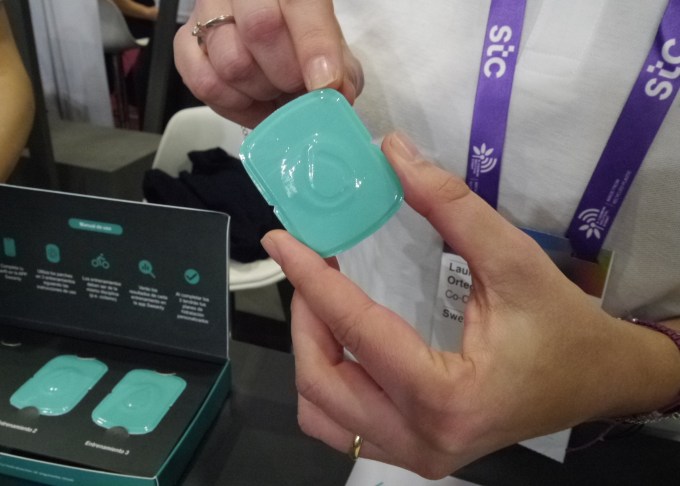
Sweanty (clever name) is the Spanish startup behind a stick-on patch for tracking athletes’ sweat to monitor salt loss and help them tailor their rehydration strategy. The system is designed to ensure athletes rehydrate with the correct amount of electrolytes (or isotonic drinks) after each training session. Analysis of the patch wearers’ “sweatprofile” is sent to a companion app where they access their tailored hydration plan.
Qilimanjaro named winner of 4FYN pitch competition

Qilimanjaro was chosen as the winner of the Four Years From Now (4YFN) pitch competition, which aims to find the “best startups” around the globe. The company, based in Spain, is a full-stack quantum computing company focused on high-quality qubit architectures and “coherent quantum annealers, which do not require quantum error correction and can be therefore faster-to-market.” It was awarded €20,000.
In this week’s competition, Qilimanjaro was among five finalists to emerge from hundreds of applications:
- Bitsensing, based in South Korea, is developing radar technology that can detect if passengers are inside a car or not, without using cameras.
- Mica AI Medical, based in Israel, is training its operating system to spot and diagnose suspicious findings in mammograms early, particularly for women with dense breasts.
- Ocean Ecostructures, based in Spain, is developing a biodiversity regeneration program that it claims regenerates marine life and aims to mitigate the environmental effects of “gray oceans.”
- Whispp, based in the Netherlands, develops an “assistive voice tech and calling app” that converts whispered and vocal cord impaired speech into a person’s natural voice, in real time. Check out TechCrunch’s coverage of the company from January.
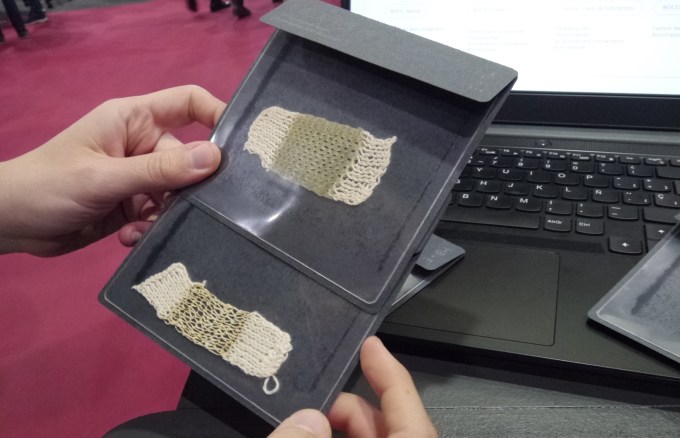
Eco-friendly thread . . . made from kombucha?
If the taste of kombucha isn’t your cup of tea, you might enjoy this use for it. While scouting out the Four Years From Now (4YFN) exhibition floor, Natasha Lomas spoke with Laura Freixas about her PhD research project that’s using a base of the fermented hipster tea to “upcycle” organic waste into filaments. Freixas and her peers at the Barcelona School of Design and Engineering are aiming to commercialize the bio-filament and are calling it Biocel. Step aside mycelium, kombucha is coming for ya.
Nothing Phone (2a)

Update, March 5: The Nothing Phone (2a) is now officially official, just under a week after it made its limited debut at the company’s MWC after party. Nothing’s third phone is the first that goes directly after the mid-tier/budget space, with a starting price of $349. More here.
London phone company Nothing unveiled its Nothing Phone (2a), and true to form, is teasing out little bits of information rather than making a big splash as other tech companies do. While technically the company’s third phone, Brian Heater explains, “The ‘a’ bit, as you’ve likely gathered from previous handsets, implies a budget focus. In recent years, that’s mostly been a game of deciding which flagship features can sacrificed to reduce the price, while keeping is close to a premium feel as possible.” Much about the phone is similar to Nothing’s earlier devices, however what’s different is that the Phone (2a) is powered by a MediaTek Dimensity 7200 Pro chip, a variant built specifically for the device.
Tuesday, February 27
HTC Vive became an enterprise business
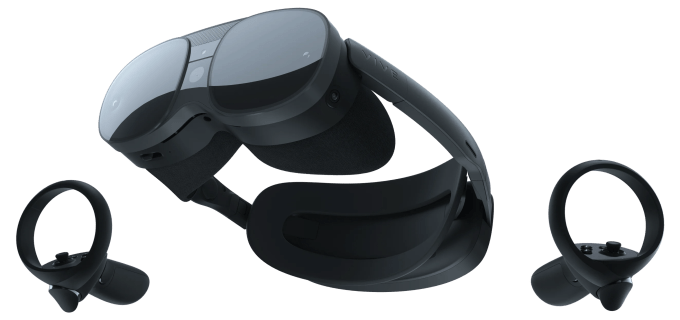
HTC broke off into a mixed reality division about a decade ago. During that time, Vive’s headsets have gone from a mostly consumer play to more of an enterprise tool. Brian Heater sat down with Dan O’Brien, HTC’s Vive general manager, and John Dabill, the brand’s head of product operations, to discuss Vision Pro, Magic Leap, the metaverse and generative AI.
eQub digitizes peer-to-peer lending in Africa

Meet eQub, an Ethiopian startup and winner of the fintech pitch-off at 4YFN 2024, Mobile World Congress’ startup event. Nahom Michael, the company’s business development lead, explained that the company’s name is an Amharic word referring to a local form of peer-to-peer credit. An Equb is a group of people who join forces to save money, similar to a tanda, which is then distributed on a rotating basis. eQub is digitizing the experience, starting with an app, to target users among the growing number of Ethiopians who have bank accounts and mobile phones, but limited access to credit.
SynFlora is taking on acne
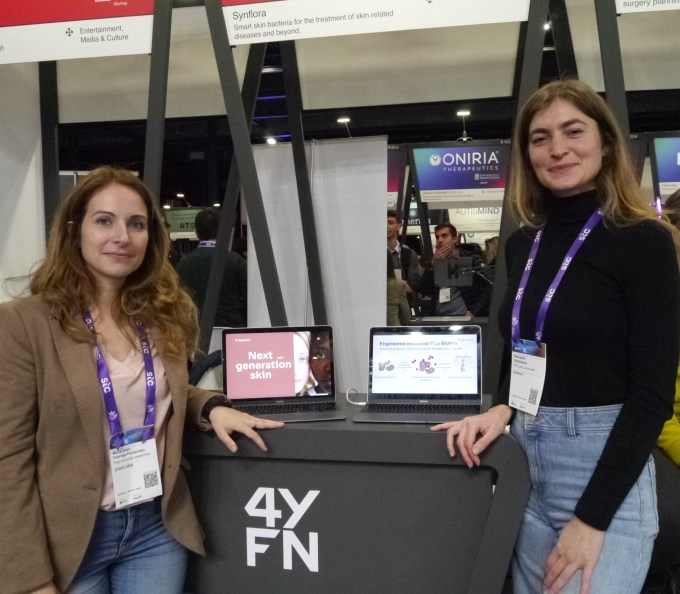
The skin is the largest organ that we have, and we don’t always treat it right. That’s where biotech startup SynFlora comes in with a new type of skin treatment technology. The company is initially focused on acne and is working on a way to deliver the treatment in a deeper way than topically applied creams and also to design and engineer a wider range of treatments by using biotech methods to harness bacteria to deliver targeted therapeutics.
Lizcore’s sport tracking system
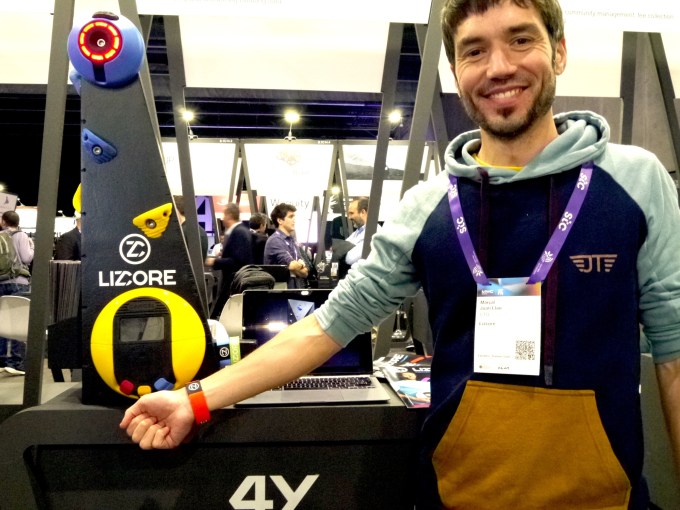
Lizcore has done what Natasha Lomas thought was impossible: digitizing and improving the indoor climbing experience. With Lizcore’s progress tracking system, climbers don’t need to climb with their phone or wear a smartwatch. All they need is its lightweight NFC wearable, which the company calls the Lizy bracelet that pairs with the startup’s app.
Jolla’s “blackbox for your life”
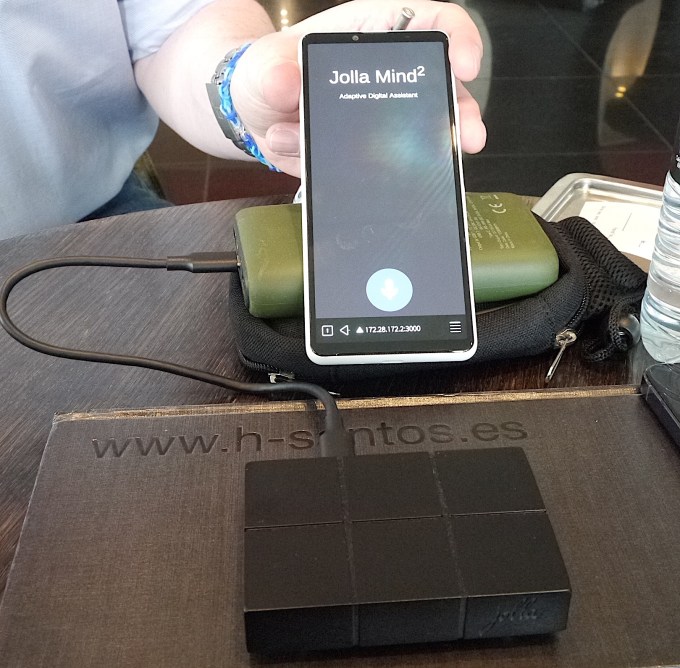
Jolla, a mobile OS maker, is designing a way for users to gain the superpower of advanced AI without having to let data-hungry third parties gobble their privacy. It is showcasing a device that is like a private cloud and AI router all rolled into one, making the user’s data accessible for running AI queries. It’s like having a personal server “reconfigured for the generative AI age,” Natasha Lomas writes.
Displace wireless television
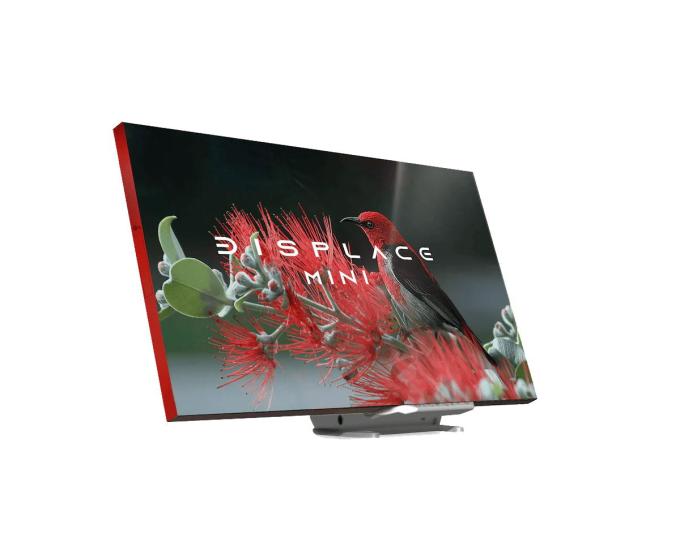
Mike Butcher caught up with Displace founder and CEO Balaji Krishna, who discussed the company’s 55-inch Display Flex product. It’s a “wireless” $3,000 4K OLED TV that sticks to walls without a traditional mounting. It was launched in January at CES. Krishna says more versions of the screen, and new features, are coming. One we can talk now about is a “Display Mini” that will be a smaller 27-inch TV and designed for a kitchen or bathroom space. Krishna also hinted at future feature based on an “AI-powered shopping engine” letting consumers purchase products from ads, and a contactless payment reader.
Motorola’s rollable concept phone
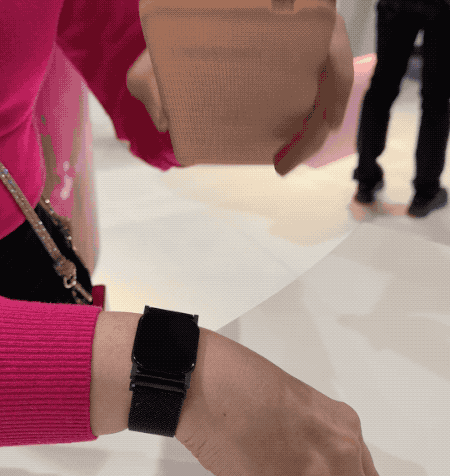
What’s the maximum size of a device that you will wear on your wrist? If “bigger is better” is your go-to answer, Lenovo has something for you. The company has designed what it’s calling a “rollable concept phone” for Motorola that folds around your wrist. Key word being “concept,” because there is no proof this could become a product. Regardless, it’s fun to see.
Monday, February 26
Doublepoint’s updated WowMouse gesture-touch
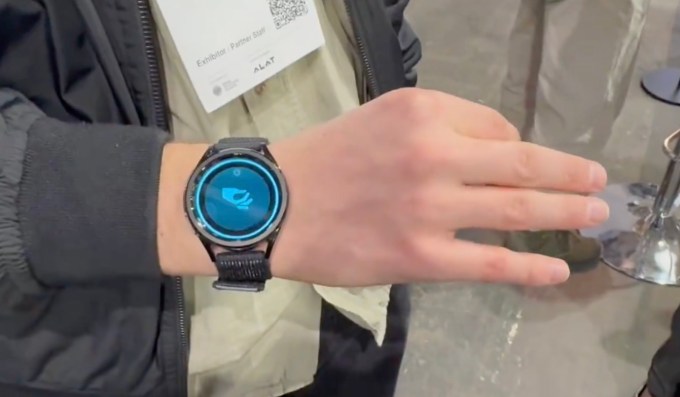
Android smartwatch users can now have their own version of Doublepoint’s WowMouse gesture-touch control app. Pinch away!
Microsoft’s AI Access Principles

Brad Smith, the president and vice chair of Microsoft, announced a framework today called “AI Access Principles,” which is an 11-point plan that Smith said will “govern how we will operate our AI datacenter infrastructure and other important AI assets around the world.” Although the implication here is that Microsoft is open to dialogue and conversation with stakeholders, ironically, Smith delivered the news in a keynote speech, with no scope for follow-up questions.
Xiaomi’s first electric car
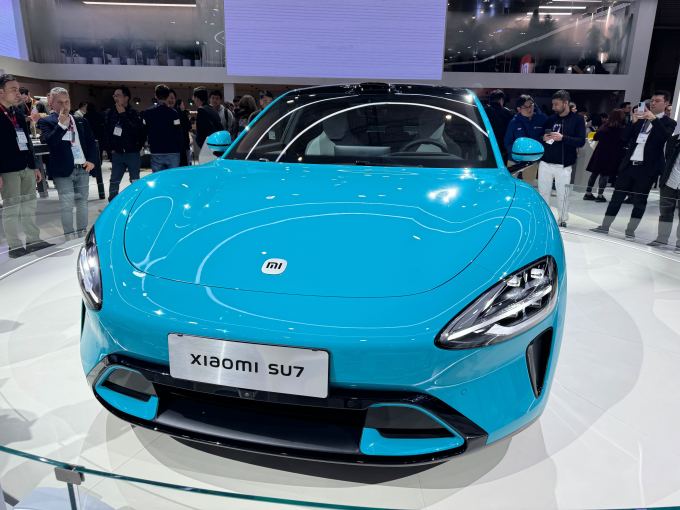
Xiaomi EV’s first product — the highly anticipated Xiaomi SU7 — is light on details. We do know that it is a “full-size high-performance eco-technology sedan” with plans to arrive in China at some point next year. In addition to design, Xiaomi has developed the five core EV technologies: E-Motor, CTB Integrated Battery, Xiaomi Die Casting, Xiaomi Pilot Autonomous Driving, and Smart Cabin. And, as mentioned before, it will have the “HyperOS” operating system.
Samsung’s first smart ring
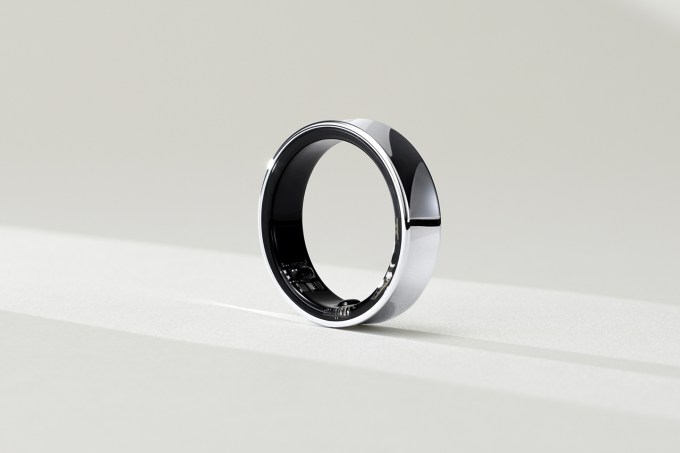
Diamonds may be a girl’s best friend, but if you’re a girl who can’t sleep, Samsung’s new Galaxy Ring may become your new favorite. Some of the features include on-board sensors to measure heart rate, movement and breathing to create a cross section of the wearer’s health and sleep patterns. Questions around pricing and battery life remain unanswered for now.
Extended battery life for OnePlus

OnePlus’ upcoming Watch 2 is promising a jaw-dropping 100 hours “in full Smart Mode.” This claim comes after the company spent three years on its battery technology. Brian Heater spoke with Tuomas Lampén, OnePlus Europe’s head of strategy, about why the company took that long and how it was able to squeeze 100 hours out of the new watch.
Last week, Brian reported that “battery is precisely the sort of thing OnePlus needs to lean into,” given that its first-generation product had only about 25 hours of battery life. And that was with the GPS turned off.
Xiaomi’s CyberDog
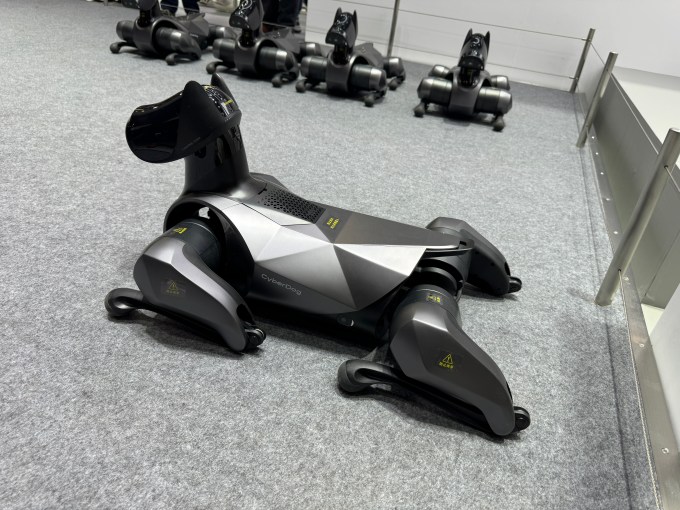
After years of reporting on Xiaomi’s CyberDog, Brian Heater was finally able to see the robotic dog up close at MWC. He got to see the little dog’s dressage shuffle and do a little dance, which he wrote reminded him “of a scaled down version of Boston Dynamics’ familiar robot.” Since Brian’s story in 2021, Xiaomi has made some changes to its dog, including a more realistic version of a head to replace the previous flatter one. CyberDog 2 can currently be purchased online for $3,000 — that’s nearly double the $1,600 price point of its predecessor.
Lenovo’s laptop concept
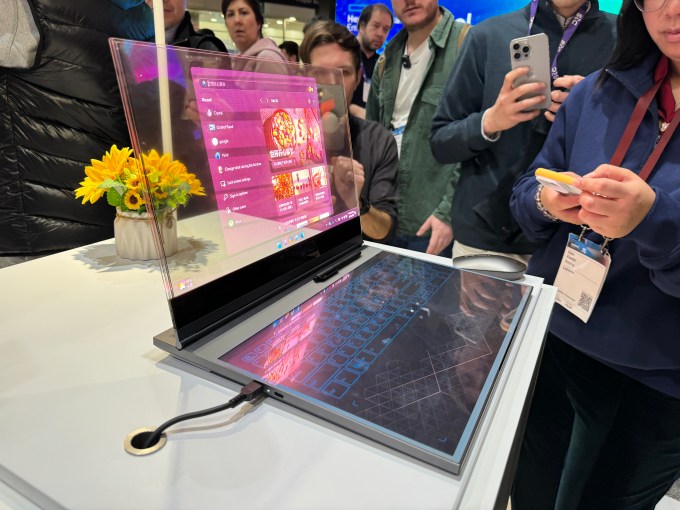
If you’ve always wanted to look at the back of your desk while working, Lenovo’s new transparent laptop will certainly give you that joy. That is, if it ever makes it to production. It looks like your standard laptop with a few exceptions — the screen has a transparent pane, and it and the keyboard part remind us of an augmented reality experience, meaning the graphics are overlaid on whatever is behind it. For now, Lenovo enjoys showing off its creativity.
Google brings AI to new features
Today, Google rolled out AI into more of its services, including a new set of features for phones, cars and wearables. These are using Gemini to craft messages, AI-generated captions for images, summarizing texts through AI for Android Auto, along with access to passes on Wear OS. In addition, Google Messages will get a feature that lets you access Gemini in the app. The feature is currently in beta and only supports English. The mobile giant is also launching some accessibility-related features as well. One is the Lookout app, which helps visually impaired people with things like food labels and documents and will now generate AI-powered captions for images that have missing or inaccurate captions or alt text.
Also at MWC, DeepMind founder Demis Hassabis spoke on a panel with Wired’s Steven Levy to talk about Google being able to “unpause” the ability of its multimodal generative AI tool, Gemini, to depict people. The capability to respond to prompts for images of humans should be back online in the “next few weeks,” he said. Natasha Lomas reports that “Google suspended the Gemini capability last week after users pointed out the tool was producing historically incongruous images, such as depicting the U.S. Founding Fathers as a diverse group of people, rather than only white men.”
A desktop lamp to improve your mood

Seaborough, a Dutch company, showcased small devices designed to replace large light therapy lamps that mimic the sun’s impact on the production of serotonin in the brain. One sits next to the computer and the other clips above display, looking a lot like an external webcam. Both plug into the USB port for power. You’ll have to wait a bit, though, as the lamp is still in proof-of-concept mode.
Infinix wants to put the back of your phone to work
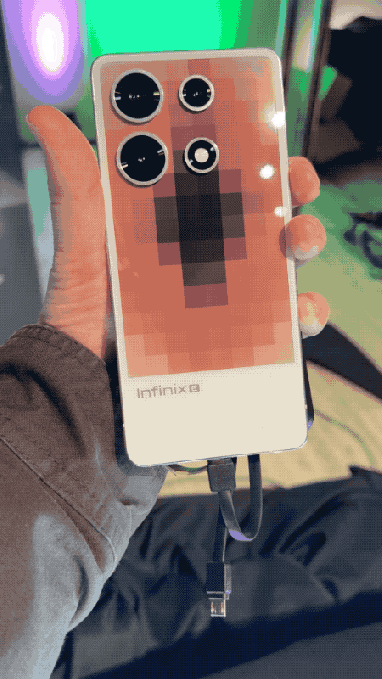
The Infinix E-Color Shift improves upon the e-ink screen work started by YotaPhone years ago. What’s new here is the addition of color and what Brian Heater describes as “a fun aesthetic addition to the part of your device that is nearly always covered by a case, your hand or otherwise facedown on a table.”































Comment